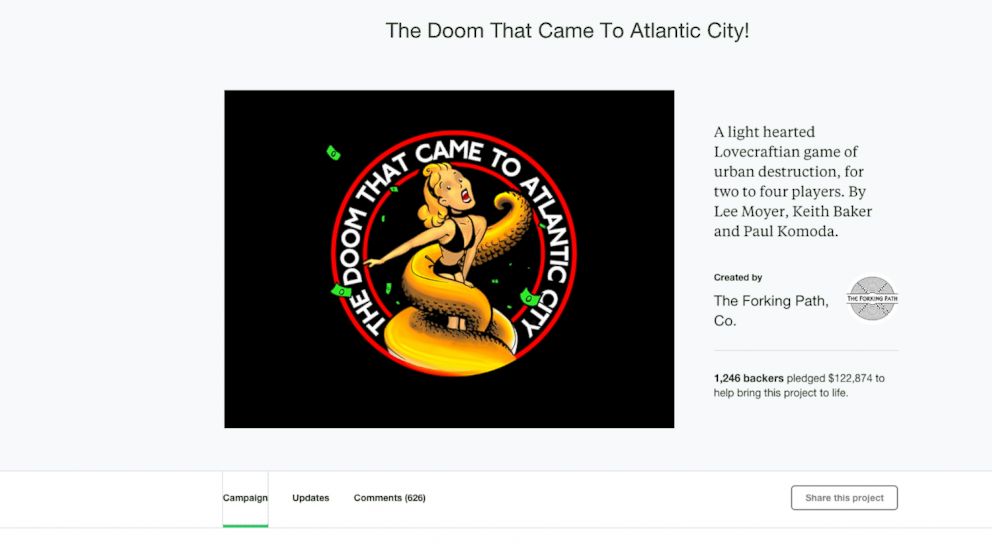FTC Goes After Crowdfunding Campaign For Doom Game That Didn’t Deliver
It was a Kickstarter campaign to make a new game: Monopoly meets Game of Thrones

— -- It had the look and feel of a board game winner: Monopoly meets Game of Thrones.
There was a dramatic design and sculpted pewter game pieces that excited the gaming world.
“The Doom That Came To Atlantic City” just needed $35,000 from investors, Erik Chevalier claimed on Kickstarter, a self-described “way to fund creative projects” through personal donations. He promised that investors would get rewards, such as a copy of the game or game pieces.
The grassroots fundraising campaign quickly took off, attracting 1,246 investors who donated nearly four times the initial request: $122,874, but that was three years ago. Then Chevalier suddenly posted in 2013: "The project is over, the game is canceled."
Today, the Federal Trade Commission (FTC) filed court papers in Oregon in the first case against a crowdfunding campaign, using it as a warning to consumers.
The FTC is claiming Chevalier "participated in deceptive acts" and ran a "fraudulent crowdfunding campaign," according to the court order.
“Our evidence shows he did not even spend the money he collected on the venture,” Jessica Rich, Director of Consumer Protection at the FTC told ABC News. “He spent it on his rent, on moving to Oregon, and other personal expenses.”
The FTC says very few, if any, of the investors got their money back and instead much of the cash was spent on a $2,300 a month apartment, according to the civil complaint and court order.
Kickstarter investor comments were hostile, demanding to know where the money went, according to the listing.
Chevalier would not grant an interview with ABC, so we tracked him down in a small New Hampshire town. His expensive home gone, he now lives with his parents.
When ABC News found him at a local coffee shop drive-through near his home, he insisted he had spent most of the money trying to make the game.
"I worked on the project, tried to get it made it didn’t work out," he said. "What I said online was honest."
The FTC disagrees.
“He spent a lot of that on his personal expenses. He used that money as a personal piggy bank,” Rich said.
Erik Chevalier has now signed a settlement agreement with the FTC under which, without admitting or denying guilt, he promises not to mislead investors in the future.
The FTC complaint also sought to force Chevalier to provide monetary relief to the agency for the benefit of his investors, but a judgment of $111, 794 is suspended in the settlement agreement based on Chevalier’s representations that he lacks assets with which to pay.
While Chevalier’s investors never did get their promised games or game figures from Chevalier, the two men who originally designed the game, Lee Moyer and Keith Baker, did get the game made by Cryptozoic, who agreed to give all the original investors a free copy.
The FTC says most crowdfunding projects are legitimate, but Chevalier’s case demonstrates that the popular investment tool has its risks.
"Our creators have a great track record, and the Kickstarter community has helped bring so much great creative work to life," a Kickstarter spokesman said. "In this case, when a project went off track, members of our community stepped in to make things right. It's a powerful example of how Kickstarter is about so much more than raising money."
Reminding consumers — many websites like Kickstarter make it clear, if someone takes the money and runs, it’s up to the investor to do the chasing.




